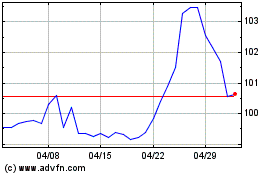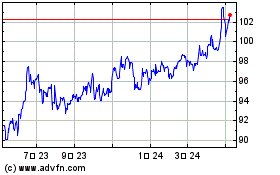Yen Falls As BoJ Keeps Policy Rate Unchanged
2024年12月19日 - 11:06AM
RTTF2
The Japanese yen weakened against other major currencies in the
Asian session on Thursday, after the Bank of Japan left its key
interest rates unchanged as policymakers were concerned about risks
related to economic activity and prices.
At the policy board meeting, members voted 8-1 to maintain the
uncollateralized overnight call rate to remain at around 0.25
percent. This was the highest since late 2008.
The BoJ had ended its negative interest rate policy in March and
last lifted the interest rate in July to 0.25 percent. So far, the
BoJ has tightened the policy twice this year.
The board said it is necessary to pay due attention to
developments in financial and foreign exchange markets and their
impact on Japan's economic activity and prices.
"In particular, with firms' behavior shifting more toward
raising wages and prices recently, exchange rate developments are,
compared to the past, more likely to affect price," the bank
said.
The safe-haven yen slid further following the speech of the BoJ
Governor Kazuo Ueda on policy outlook after holding interest
rate.
"Will keep adjusting degree of easing if our economic, price
outlook is to be realised," Ueda said.
The U.S. Federal Reserve on Wednesday cut the key lending rate
by 25 basis point as expected but revised its projections to signal
just two interest rate cuts next year compared to the four
previously forecast, citing stubbornly high inflation.
Fed Chair Jerome Powell's explicit - and repeated - references
to the need for caution from here underscored investor concerns
that Trump's fiscal, trade and tariff policies may fuel inflation
and keep U.S. interest rates higher for longer.
In the Asian trading today, the yen fell to nearly a 1-month low
of 155.49 against the U.S. dollar and more than a 3-week low of
173.25 against the Swiss franc, from yesterday's closing quotes of
154.80 and 171.73, respectively. If the yen extends its downtrend,
it is likely to find support around 157.00 against the greenback
and 175.00 against the franc.
Against the euro and the pound, the yen slipped to a 2-day low
of 161.85 and nearly a 1-month low of 196.27 from Wednesday's
closing quotes of 160.25 and 194.63, respectively. The yen may test
support near 164.00 against the euro and 196.00 against the
pound.
Against the Australia and the New Zealand dollars, the yen
slipped to 97.10 and 87.81 from an early 10-day high of 95.90 and
more than a 3-month high of 86.75, respectively. On the downside,
100.00 against the aussie and 92.00 against the kiwi are seen as
the next support levels for the yen.
The yen slid to a 2-day low of 108.00 against the Canadian
dollar, from an early 8-day high of 106.92. The next possible
downside target for the yen is seen around the 112.00 region.
Looking ahead, the European Central Bank publishes euro area
current account data for October in the European session at 4:00 am
ET.
The Bank of England is set to announce its the interest rate
decision at 7:00 am ET. The Monetary Policy Committee is forecast
to leave the interest rate unchanged at 4.75 percent. The bank had
reduced the rate by quarter-point each in November and August.
In the New York session, Canada average weekly earnings data for
October, U.S. weekly jobless claims data, U.S. Philadelphia Fed
manufacturing index for December, U.S. core PCE prices data for the
third quarter, existing home sales for November, U.S. Consumer
Board's leading index for November and U.S. Kansas Fed composite
index for December are slated for release.
AUD vs Yen (FX:AUDJPY)
FXチャート
から 12 2024 まで 1 2025

AUD vs Yen (FX:AUDJPY)
FXチャート
から 1 2024 まで 1 2025
